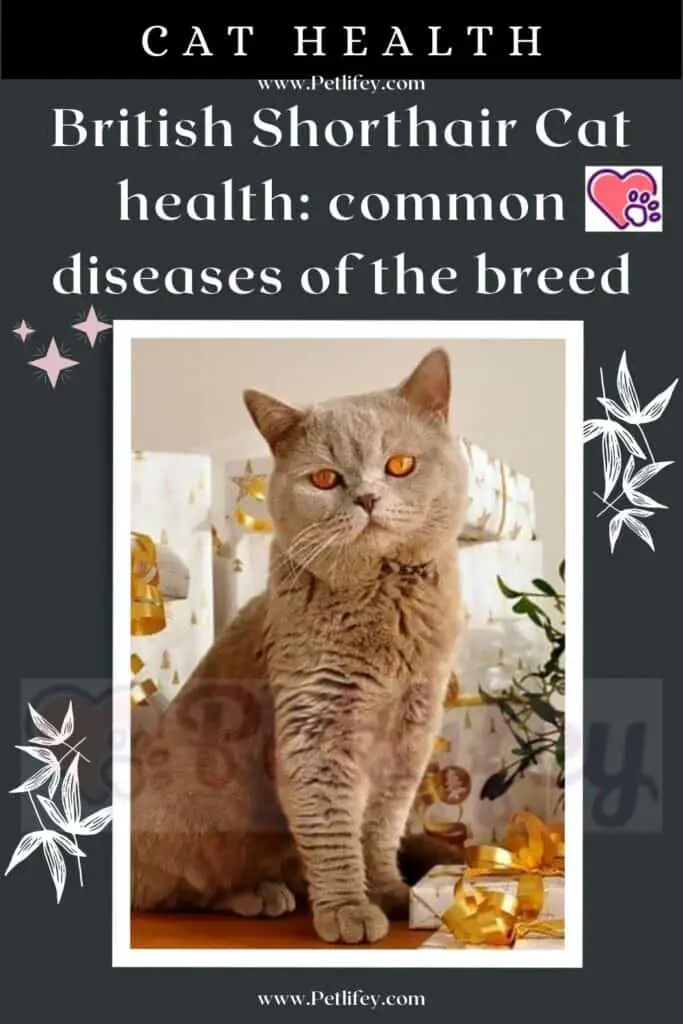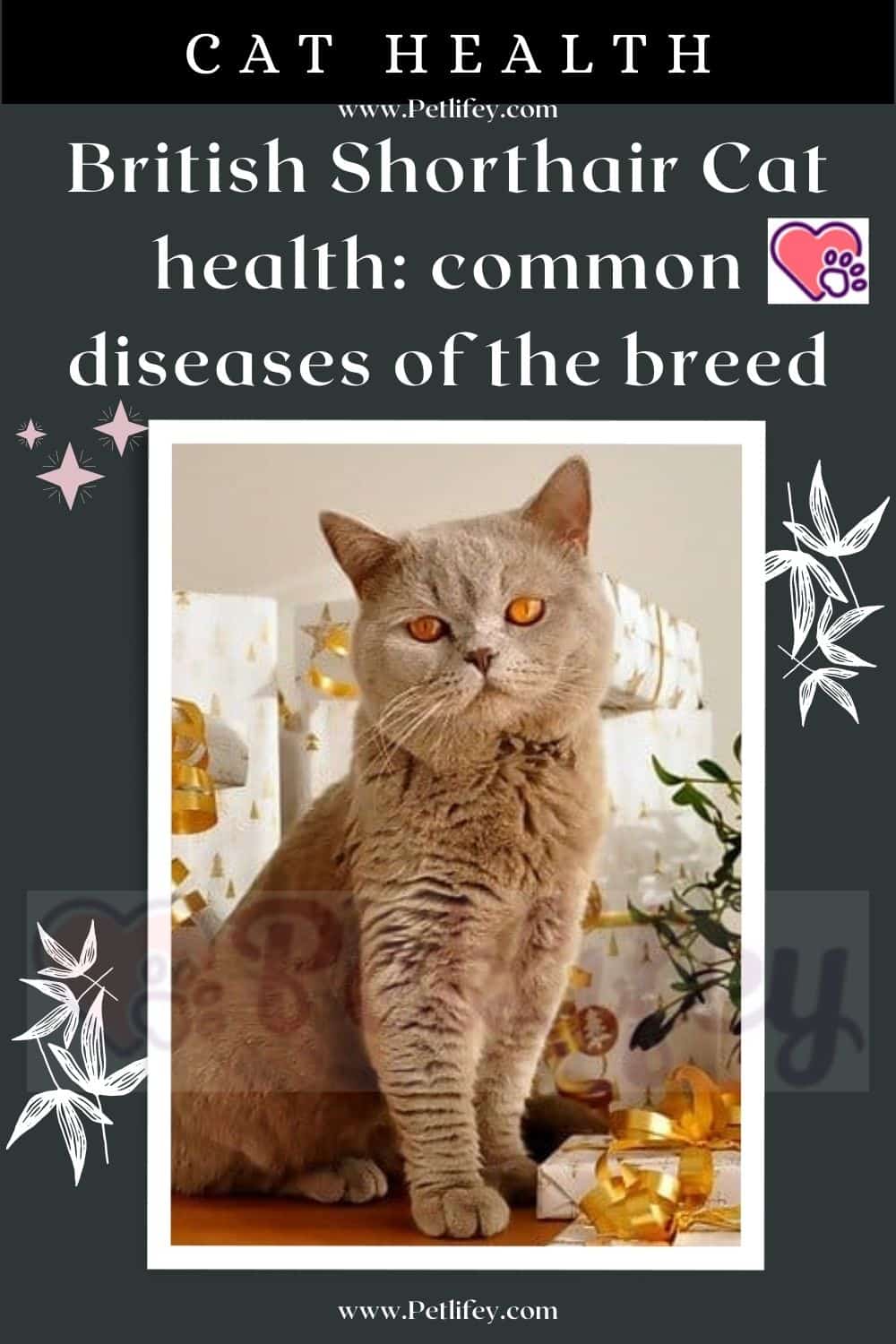British Shorthair Cat Health: Understanding Breed-Specific Ailments

Known for their dense, plush coats and easy-going temperament, British Shorthair cats are a popular choice for pets. As one of the oldest cat breeds in England, their round faces and sturdy build have captivated hearts for centuries. While they’re generally healthy, there are certain health conditions you should be aware of if you’re considering a British Shorthair as your companion.
Your British Shorthair’s health can be influenced by various genetic factors. Some common health issues include hypertrophic cardiomyopathy, a serious heart condition, and polycystic kidney disease, which is an inherited ailment. These conditions can have a significant impact on the quality of life and longevity of these beloved cats.
Regular veterinary check-ups and being attentive to your British Shorthair’s behavior and physical condition can help catch these health issues early. Early diagnosis and appropriate management are crucial in maintaining your pet’s health and ensuring that your furry friend lives a full and comfortable life.
Understanding British Shorthair Health
In caring for your British Shorthair cat, being aware of breed-specific health predispositions is crucial for maintaining their well-being and longevity.
Breed-Specific Traits and Health Predispositions
British Shorthairs are sturdy and robust cats, but they have certain traits that make them prone to specific health issues. Their dense and plush coats require regular grooming to prevent skin problems.
Common Diseases in British Shorthairs
Your British Shorthair might face several common health problems, with Hypertrophic Cardiomyopathy (HCM) being the most significant. It’s a form of heart disease where the heart muscle thickens. Another condition to be aware of is Polycystic Kidney Disease (PKD), which leads to cyst formation in the kidneys.
Inherited Conditions and Genetic Testing
Some health issues in British Shorthairs are inherited. It’s essential to test for these diseases, such as PKD and HCM, through genetic tests offered by veterinary services. This can guide in breeding decisions and early health care planning.
Nutrition and Weight Management
A balanced diet and regular exercise are paramount. Overfeeding can lead to obesity, which exacerbates health problems. Monitor your cat’s food intake and ensure they have a diet appropriate for their age, size, and activity level.
Preventive Care and Regular Check-Ups
Regular vaccinations and check-ups with your vet are vital in preventing serious health issues. Grooming and dental care also play a significant role in a British Shorthair’s overall health.
Symptoms and Early Detection
Be vigilant for symptoms like vomiting, loss of appetite, diarrhea, and increased thirst. Early detection of heart disease could be critical, with blood clots and heart failure as potential severe outcomes.
Emergency Health Issues
Certain health problems, such as feline aortic thromboembolism (FATE) related to HCM, require immediate veterinary care. Don’t ignore any sudden change in your cat’s behavior or health—it could indicate a serious health problem.
Disease Management and Treatment
Effective management of British Shorthair cat health involves prompt recognition and appropriate treatment of diseases. Your awareness of the conditions affecting this breed, along with a proactive healthcare approach, can help ensure better outcomes.
Cardiomyopathy and Heart Conditions
Hypertrophic cardiomyopathy (HCM) is a heart condition commonly diagnosed in British Shorthairs, wherein the heart muscle abnormally thickens. Medication can manage symptoms and slow progression, but regular veterinary check-ups are essential to monitor heart function. In cases of congestive heart failure, a combination of diuretics, beta-blockers, and ACE inhibitors may be prescribed.
- Medication List:
- Beta-blockers
- ACE inhibitors
- Diuretics
Polycystic Kidney Disease and Renal Challenges
Polycystic kidney disease (PKD) is an inherited condition where small cysts develop in the kidneys, possibly leading to renal impairment or kidney failure. Monitoring kidney function with routine blood tests can help in managing the disease’s progression. There is no cure, but treatment focuses on diet and managing the symptoms to maintain quality of life.
- Management Strategies:
- Regular blood testing
- Appropriate diet
- Monitoring hydration
Feline Lower Urinary Tract Diseases
Feline Lower Urinary Tract Disease (FLUTD) can cause urethral blockages and irritation in your cat’s bladder and urethra. It’s essential to address this quickly as blockages can be life-threatening. Treatment may include:
- Pain relief and anti-inflammatories
- Surgery in severe cases to remove bladder stones
- Stress reduction strategies
Gastrointestinal and Nutritional Health
British Shorthairs may experience vomiting, diarrhea, and weight loss due to gastrointestinal issues or food allergies. A well-managed feline diet tailored to your cat’s specific needs can prevent nutritional health problems. Be observant for any changes in eating habits or digestive upset, and consult your vet for appropriate medication and diet modification advice.
- Dietary Adjustments:
- Limited ingredient diets for allergies
- High-fiber foods for digestive health
- Probiotics to maintain gut flora balance
Long-term Care for British Shorthair Cats
Ensuring that your British Shorthair maintains a high quality of life into old age will involve careful consideration of their physical and mental health needs.
Dealing with Chronic Illnesses
British Shorthairs may face chronic illnesses such as kidney failure, diabetes, and heart disease. Monitoring weight is crucial as obesity can exacerbate these conditions. Regular vet check-ups will help you manage these illnesses effectively. Incorporate a balanced diet and medication as prescribed to keep symptoms in check.
Physical Therapy and Rehabilitation
For conditions like arthritis, which can impair mobility, physical therapies can be beneficial. Physiotherapy and exercise are essential to maintaining joint health and preventing injury. Consult with a vet to tailor a rehabilitation plan that supports your British Shorthair’s specific needs.
Senior Cat Care
As British Shorthairs age, they may become less active and more prone to health concerns. Adjust their diet to ensure it’s suitable for senior pets. Ensure they have a comfortable living environment to ease the stress on their joints. Senior cats still require exercise to maintain a healthy weight and prevent arthritis.
Mental Health and Behavioral Concerns
Your British Shorthair’s environment plays a significant role in their mental health. Reduce stress with a stable routine and provide enrichment through toys and interaction. Address behavioral issues promptly and consider changes in behavior as potential signs of underlying health problems.
Additional Health Considerations
While British Shorthairs are generally healthy, they may encounter specific health challenges. Awareness and regular care can aid in preventing or managing these effectively.
Feline Infectious Diseases
Your British Shorthair may be at risk of contagious diseases. Feline Infectious Peritonitis (FIP), caused by a strain of the feline coronavirus, can lead to serious health issues. Symptoms might include lethargy and lack of appetite, and while there is no definitive cure, supportive treatments exist. Vaccinations play a crucial role in protecting your cat against common infectious diseases.
- Keep vaccinations up to date to prevent diseases like feline leukemia (FeLV), feline immunodeficiency virus (FIV), and feline herpesvirus.
- Regular vet check-ups can detect signs of infection early, leading to more effective treatment outcomes.
Skin and Coat Health
Your cat’s skin and coat are indicators of their overall health. The British Shorthair’s dense coat requires regular grooming to prevent matting and reduce the risk of skin problems.
- Brush your cat’s fur at least once a week to manage shedding and help prevent flea infestation and allergies.
- Watch for signs of skin problems, such as redness, bald spots, or excessive scratching, which could indicate allergies or infection.
Eye Health and Visual Impairments
British Shorthairs can experience eye conditions that could lead to vision loss. Cataracts are an example, which present as cloudiness in the eye lens, potentially leading to blindness if left untreated.
- Be alert for signs of eye inflammation or changes in your cat’s eyes, and consult your vet if you notice anything unusual.
- Timely veterinary evaluation and treatment can manage eye health issues and prevent further deterioration of sight.
Breeder and Buyer Responsibilities
When acquiring a British Shorthair cat, understanding the health concerns that can affect the breed is crucial. Breeders and buyers each play key roles in ensuring the welfare and longevity of these cats.
Understanding Breeder Health Guarantees
Breeder health guarantees are important to consider when you’re looking to bring a purebred British Shorthair into your home. Responsible breeders will typically provide:
- Genetic Testing Results: They should offer proof of genetic testing for inheritable diseases common to the breed, such as hypertrophic cardiomyopathy (HCM) and polycystic kidney disease (PKD).
- Health Certificates: A guarantee or certificate stating that the kitten is free of specific health issues at the time of purchase.
It is your responsibility to review these health guarantees carefully to ensure that they are comprehensive and clear.
The Role of Potential Owners in Health
As a potential owner, your responsibilities begin with thorough research and preparation to become fully aware of what to expect:
- Exercise and Grooming: Understand the exercise and grooming needs specific to British Shorthairs to maintain their physical health.
- Awareness and Preparation: Acknowledge the potential health concerns within the breed and prepare accordingly. This includes discussing with breeders about the incidence of diseases and observing any signs of illness in your cat.
By being informed and proactive, you contribute to the betterment of the breed and the health of your future pet.
Conclusion
As a British Shorthair cat owner, you play a crucial role in maintaining the health and longevity of your pet. Understanding the common health issues that may affect British Shorthairs is essential for proactive care. These may include Hypertrophic Cardiomyopathy (HCM), a heart condition, and Polycystic Kidney Disease (PKD), which is hereditary.
Regular veterinary visits are imperative. Your vet can monitor for early signs of heart disease, kidney dysfunction, and other potential issues. Early detection often results in better management and outcomes.
Ensuring a healthy lifestyle is another key aspect of your cat’s care. A balanced diet, appropriate exercise, and minimizing stress contribute to overall well-being. Recognize signs of illness such as lethargy or poor appetite, and seek veterinary advice promptly should they arise.
Be mindful of the robust nature of the British Shorthair but remember that no breed is immune to health concerns. Insurance for your cat can alleviate the financial burden of unexpected medical bills, allowing you to focus on care rather than cost.
In caring for your British Shorthair, your awareness and actions are paramount. By combining love with a commitment to health and wellness, you can provide a supportive environment for your feline companion.







